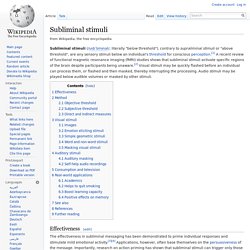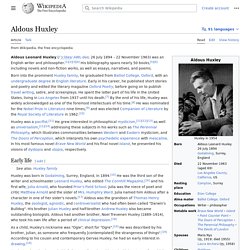

Subliminal Projection. Subliminal stimuli. Subliminal stimuli (/sʌbˈlɪmɨnəl/; literally "below threshold"), contrary to supraliminal stimuli or "above threshold", are any sensory stimuli below an individual's threshold for conscious perception.[1] A recent review of functional magnetic resonance imaging (fMRI) studies shows that subliminal stimuli activate specific regions of the brain despite participants being unaware.[2] Visual stimuli may be quickly flashed before an individual can process them, or flashed and then masked, thereby interrupting the processing.

Audio stimuli may be played below audible volumes or masked by other stimuli. Effectiveness[edit] The effectiveness in subliminal messaging has been demonstrated to prime individual responses and stimulate mild emotional activity.[3][4] Applications, however, often base themselves on the persuasiveness of the message. Method[edit] Aldous Huxley interview-1958 (FULL) The Ultimate Revolution. Aldous Huxley interviewed: part 2. Aldous Huxley interviewed: part 1. Aldous Huxley. Aldous Leonard Huxley /ˈhʌksli/ (26 July 1894 – 22 November 1963) was an English writer, philosopher and a prominent member of the Huxley family.

He was best known for his novels including Brave New World, set in a dystopian London, and for non-fiction books, such as The Doors of Perception, which recalls experiences when taking a psychedelic drug, and a wide-ranging output of essays. Early in his career Huxley edited the magazine Oxford Poetry, and published short stories and poetry. Mid career and later, he published travel writing, film stories and scripts. He spent the later part of his life in the US, living in Los Angeles from 1937 until his death. In 1962, a year before his death, he was elected Companion of Literature by the Royal Society of Literature.[1]